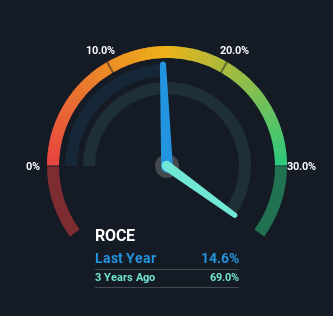- Germany
- /
- Hospitality
- /
- XTRA:ACX
The Returns On Capital At bet-at-home.com (ETR:ACX) Don't Inspire Confidence
If you're looking at a mature business that's past the growth phase, what are some of the underlying trends that pop up? A business that's potentially in decline often shows two trends, a return on capital employed (ROCE) that's declining, and a base of capital employed that's also declining. This combination can tell you that not only is the company investing less, it's earning less on what it does invest. So after glancing at the trends within bet-at-home.com (ETR:ACX), we weren't too hopeful.
Understanding Return On Capital Employed (ROCE)
Just to clarify if you're unsure, ROCE is a metric for evaluating how much pre-tax income (in percentage terms) a company earns on the capital invested in its business. The formula for this calculation on bet-at-home.com is:
Return on Capital Employed = Earnings Before Interest and Tax (EBIT) ÷ (Total Assets - Current Liabilities)
0.15 = €6.0m ÷ (€63m - €22m) (Based on the trailing twelve months to March 2023).
Therefore, bet-at-home.com has an ROCE of 15%. On its own, that's a standard return, however it's much better than the 3.0% generated by the Hospitality industry.
See our latest analysis for bet-at-home.com

Historical performance is a great place to start when researching a stock so above you can see the gauge for bet-at-home.com's ROCE against it's prior returns. If you're interested in investigating bet-at-home.com's past further, check out this free graph of past earnings, revenue and cash flow.
SWOT Analysis for bet-at-home.com
- Earnings growth over the past year exceeded its 5-year average.
- Debt is well covered by earnings.
- Earnings growth over the past year underperformed the Hospitality industry.
- ACX's financial characteristics indicate limited near-term opportunities for shareholders.
- Lack of analyst coverage makes it difficult to determine ACX's earnings prospects.
- Debt is not well covered by operating cash flow.
How Are Returns Trending?
We are a bit anxious about the trends of ROCE at bet-at-home.com. Unfortunately, returns have declined substantially over the last five years to the 15% we see today. In addition to that, bet-at-home.com is now employing 54% less capital than it was five years ago. When you see both ROCE and capital employed diminishing, it can often be a sign of a mature and shrinking business that might be in structural decline. If these underlying trends continue, we wouldn't be too optimistic going forward.
In Conclusion...
To see bet-at-home.com reducing the capital employed in the business in tandem with diminishing returns, is concerning. We expect this has contributed to the stock plummeting 93% during the last five years. Unless there is a shift to a more positive trajectory in these metrics, we would look elsewhere.
Since virtually every company faces some risks, it's worth knowing what they are, and we've spotted 4 warning signs for bet-at-home.com (of which 1 is a bit unpleasant!) that you should know about.
If you want to search for solid companies with great earnings, check out this free list of companies with good balance sheets and impressive returns on equity.
New: Manage All Your Stock Portfolios in One Place
We've created the ultimate portfolio companion for stock investors, and it's free.
• Connect an unlimited number of Portfolios and see your total in one currency
• Be alerted to new Warning Signs or Risks via email or mobile
• Track the Fair Value of your stocks
Have feedback on this article? Concerned about the content? Get in touch with us directly. Alternatively, email editorial-team (at) simplywallst.com.
This article by Simply Wall St is general in nature. We provide commentary based on historical data and analyst forecasts only using an unbiased methodology and our articles are not intended to be financial advice. It does not constitute a recommendation to buy or sell any stock, and does not take account of your objectives, or your financial situation. We aim to bring you long-term focused analysis driven by fundamental data. Note that our analysis may not factor in the latest price-sensitive company announcements or qualitative material. Simply Wall St has no position in any stocks mentioned.
About XTRA:ACX
bet-at-home.com
Through its subsidiaries, provides online sports betting and online casino services in Germany, Austria, Eastern Europe, and rest of Western Europe.
Good value with adequate balance sheet.
Similar Companies
Market Insights
Community Narratives



